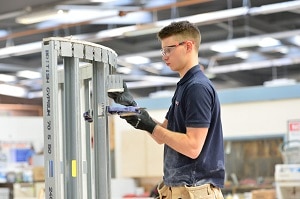When the government published its new Construction Strategy it set out a plan to increase productivity in government construction, deliver £1.7 billion worth of efficiencies and support 20,000 apprenticeships over the course of the current parliament.
Lack of skills remains the top issue that will hold not only construction back but the country as a whole. To achieve the ambitious targets of increasing the quality and quantity of skilled labour, we need to work together – up, down and across the construction supply chain.
FIS has led the skills campaign in the finishes and interiors sector and remains focused on getting the sector’s workforce fully qualified to a minimum of NVQ level 2, but where is the finishes and interiors sector going to get its quota of new apprentices and bring new recruits into the sector from?
The government strategy also sets out ambitions for smarter procurement, fairer payment, improving digital skills, reducing carbon emissions and increasing client capability. These themes are consistent with the wider ambitions for industry in Construction 2025, which is being delivered by industry and government through the Construction Leadership Council.
What’s clear, yet again, is the need to involve specialists even earlier in the procurement process if they are to not only deliver new skilled resources but also bring their slice of the efficiency cake to the table in a truly sustainable way.
Specialists are in a unique position to advise on ways to improve the buildability process. Be this helping designers and specifiers with practical detailing or suggesting better sequencing. When given the opportunity to perform, the level of quality is something the sector should be proud of – just take a trip to see Here East in Stratford, East London .
I have this feeling that we’ve been here before, where those remote from the workface talk strategy and don’t understand real construction. The supply chain remains the foundation to turn concept into reality.
Adrian JG Marsh Editor


